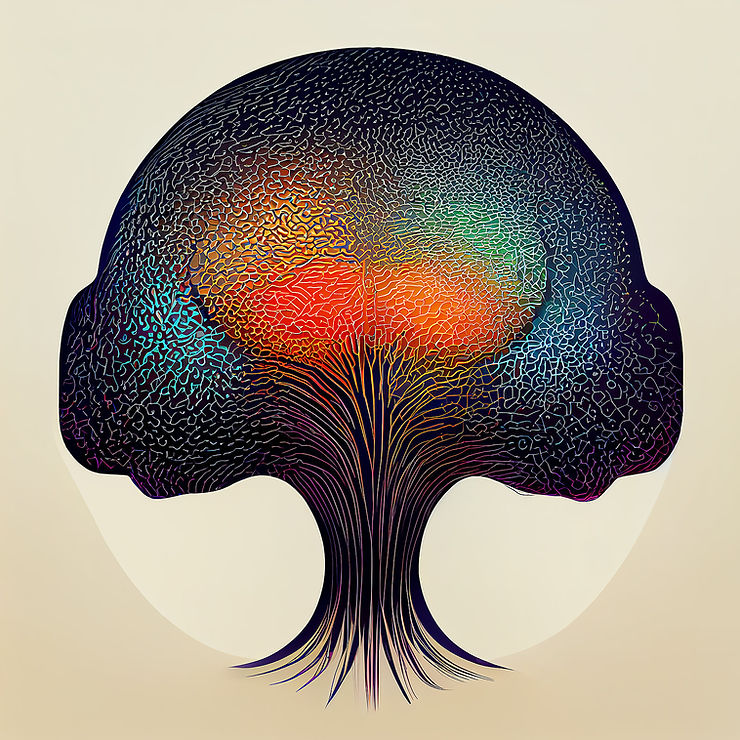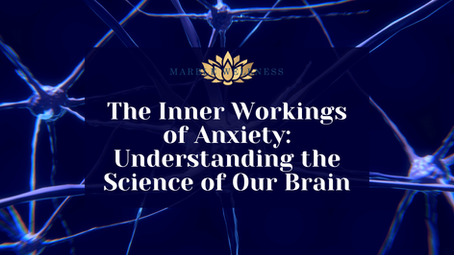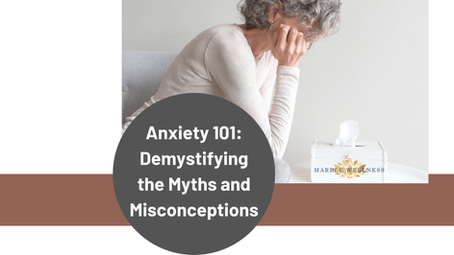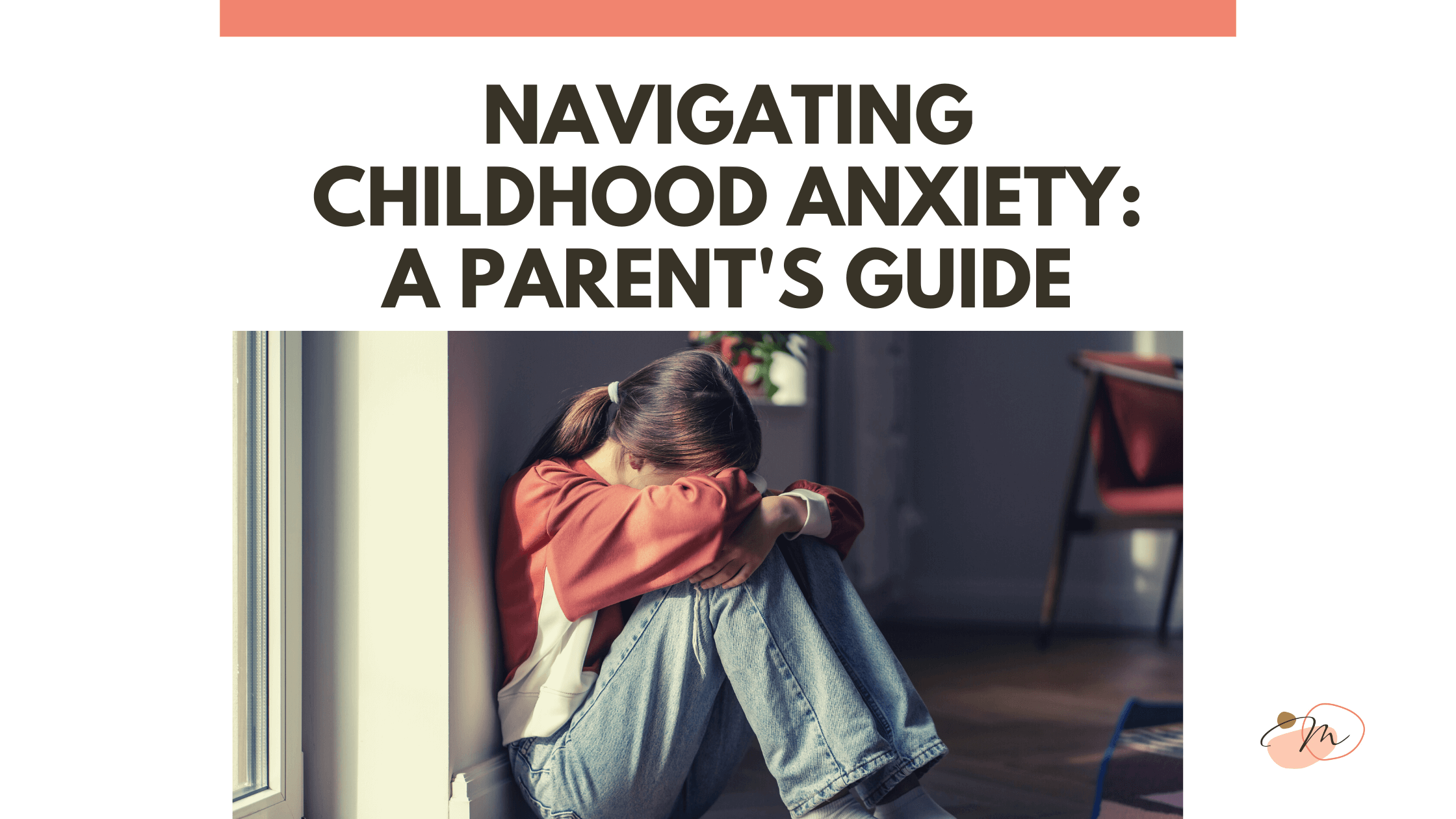Anxiety is a common experience that affects millions of individuals worldwide. However, it is often misunderstood and can leave us feeling overwhelmed and uncertain. By delving into the inner workings of our brain, we can gain a deeper understanding of anxiety, its underlying causes, and effective strategies for managing it. At Marble Wellness in St. Louis, MO, we believe in empowering individuals with the knowledge and tools to take control of their mental health. In this article, we will explore the latest research on anxiety, including the role of brain regions, neurotransmitters, and environmental factors. We will also discuss practical coping mechanisms and anxiety treatment options to help you better understand and manage anxiety.

The Brain and Anxiety – Understanding the Science:
Anxiety is a complex emotion that originates in the brain. Researchers have identified several key brain regions involved in the experience of anxiety. Two crucial regions are the amygdala and the prefrontal cortex.
The Amygdala and Anxiety:
The amygdala, an almond-shaped structure deep within the brain, plays a significant role in processing emotions, including fear and anxiety. It acts as an alarm system, alerting us to potential threats. In individuals with anxiety disorders, the amygdala may be overactive, leading to heightened fear responses and anxiety. Research has shown that increased amygdala activity is associated with the anticipation of negative events and the interpretation of ambiguous stimuli as threatening. This hyperactivity can contribute to the persistent and excessive worry experienced by those with anxiety disorders.
The prefrontal cortex and anxiety:
The prefrontal cortex, located at the front of the brain, is responsible for higher-order cognitive functions, such as decision-making and regulating emotions. In individuals with anxiety, the prefrontal cortex may exhibit reduced activity, impairing the ability to regulate fear and anxiety effectively. The prefrontal cortex plays a crucial role in down-regulating the amygdala’s fear response. When this regulatory function is compromised, individuals may struggle to control anxious thoughts and emotions. This imbalance between the prefrontal cortex and the amygdala can contribute to the persistence of anxiety symptoms.
The role of neurotransmitters in anxiety:
Neurotransmitters, chemical messengers in the brain, play a crucial role in anxiety. Imbalances in neurotransmitters, such as serotonin, gamma-aminobutyric acid (GABA), and norepinephrine, have been associated with anxiety disorders. Serotonin is involved in mood regulation, and lower levels have been linked to anxiety and depression. GABA is an inhibitory neurotransmitter that helps to reduce anxiety and promote relaxation. Insufficient GABA activity can contribute to anxiety symptoms. Norepinephrine is associated with the body’s stress response, and excessive levels can lead to heightened anxiety. Understanding the role of these neurotransmitters provides insights into the underlying biological mechanisms of anxiety and informs treatment approaches that target their regulation.
The fight or flight response:
Anxiety is closely tied to our body’s innate fight or flight response, a survival mechanism that prepares us to face perceived threats. When we encounter a threat or stressful situation, our body releases stress hormones like cortisol and adrenaline. This response triggers physiological changes, including increased heart rate, rapid breathing, heightened senses, and a surge of energy, preparing us to fight or flee. While this response can be helpful in certain situations, such as escaping from immediate danger, it can become problematic when it is activated too frequently or intensely, leading to chronic anxiety. Individuals with anxiety disorders may experience an overactive fight or flight response, resulting in persistent feelings of fear and heightened physiological arousal even in the absence of real danger.
Types of anxiety disorders:
Here is a list of the different types of anxiety disorders you may encounter.
- Anxiety disorders encompass a range of conditions, each with its own distinct features and triggers. Generalized Anxiety Disorder (GAD) is characterized by excessive and uncontrollable worry about various aspects of life, often without a specific cause.
- Panic Disorder involves recurring panic attacks, which are sudden and intense episodes of fear accompanied by physical symptoms such as a rapid heartbeat, shortness of breath, and chest pain.
- Social Anxiety Disorder, also known as social phobia, is marked by an intense fear of social situations and a strong desire to avoid judgment or embarrassment. Specific phobias are characterized by excessive fear and avoidance of specific objects or situations, such as heights, spiders, or flying.
- Obsessive-Compulsive Disorder (OCD) involves intrusive thoughts (obsessions) and repetitive behaviors or mental acts (compulsions).
- Post-Traumatic Stress Disorder (PTSD) can develop after experiencing or witnessing a traumatic event, leading to symptoms such as flashbacks, nightmares, and hypervigilance.
- Separation Anxiety Disorder primarily affects children but can also occur in adults and involves excessive distress when separated from attachment figures or familiar environments. Understanding the different types of anxiety disorders is crucial for accurate diagnosis and targeted treatment interventions.
Symptoms of anxiety disorders:
Symptoms of anxiety disorders can vary from person to person, but they often include feelings of restlessness, irritability, difficulty concentrating, sleep disturbances, and physical symptoms like rapid heartbeat, shortness of breath, and gastrointestinal distress. Individuals may also experience a sense of impending doom, excessive worry, or a constant need for reassurance. These symptoms can significantly interfere with daily life, causing distress and impairing social, occupational, and academic functioning. It is important to recognize these symptoms and seek support if they persist and interfere with one’s ability to live a fulfilling life.
Coping mechanisms for anxiety:
There are several practical coping mechanisms that can help manage anxiety and alleviate its impact on daily functioning.
- Mindfulness techniques, such as deep breathing exercises, meditation, and progressive muscle relaxation, can help calm the mind and reduce anxiety symptoms. These practices promote present-moment awareness and assist individuals in observing their thoughts and emotions without judgment.
- Cognitive-behavioral therapy (CBT) is a widely used therapeutic approach for anxiety disorders. CBT helps individuals identify and challenge negative thought patterns associated with anxiety and develop more adaptive and realistic thinking styles. This therapy also focuses on implementing behavioral strategies to gradually confront feared situations or objects, promoting desensitization and empowerment.
- Engaging in regular physical exercises, such as aerobic activities or yoga, has been shown to reduce anxiety by releasing endorphins, improving sleep, and providing a healthy outlet for stress.
- Maintaining a balanced and nutritious diet, limiting the consumption of stimulants like caffeine, and ensuring adequate sleep can also support overall mental well-being and minimize anxiety symptoms.
Treatment options for anxiety disorders:
- Treatment options for anxiety disorders may involve anxiety therapy, medication, or a combination of both, depending on the severity and individual needs.
- Utilizing Community Resources such as parks, museums, and gardens can help alleviate the symptoms of anxiety.
- Therapy, such as cognitive-behavioral therapy (CBT), can help individuals develop coping strategies, challenge negative thought patterns, and overcome specific fears and triggers. Exposure therapy is a form of CBT that gradually exposes individuals to feared situations or objects, helping them develop resilience and reduce avoidance behaviors.
- Other therapeutic approaches, such as acceptance and commitment therapy (ACT) or dialectical behavior therapy (DBT), may be beneficial for certain individuals or specific anxiety disorders.
- Medications, such as selective serotonin reuptake inhibitors (SSRIs), serotonin-norepinephrine reuptake inhibitors (SNRIs), or benzodiazepines, may be prescribed by a healthcare professional to alleviate anxiety symptoms. Medication can be particularly helpful for individuals with severe anxiety or when combined with therapy.
- It is important to consult with a qualified healthcare provider to determine the most suitable treatment approach based on an individual’s specific needs and preferences.
Are You Ready to Gain a Better Understanding of the Brain and Anxiety? Reach out to an Anxiety Therapist in St. Louis, MO.
Understanding the complexities of anxiety involves examining its neurobiological underpinnings, the impact of the fight or flight response, the range of anxiety disorders, and the associated symptoms. By exploring these facets, we gain insight into the intricate nature of anxiety and can tailor interventions and support accordingly. The combination of therapeutic approaches, coping mechanisms, and, when necessary, medication can empower individuals to effectively manage their anxiety and improve their overall well-being. At Marble Wellness in St. Louis, MO, our team is dedicated to providing an empowering, supportive, collaborative, and action-oriented approach to mental health care, ensuring that individuals have the resources and guidance to navigate their anxiety journey successfully.
Our Client & Project Coordinator will be your first point of contact. She’ll get you set up with a good match for you on our team, and talk first appointment details.
Meet with one of our Anxiety Therapists:
All of the members of our team are trained in and skilled at treating anxiety. They will work with you to personalize a plan to cope with and reduce your anxiety.
Start to overcome your anxiety:
Whether it’s in-person, online, or park therapy, you and your therapist will use their skills and strengths to help you start to live a life free from anxiety.
Other Mental Health Services at Marble Wellness
At Marble Wellness, our goal is simple: Counseling services are designed to help set you on a path of living a more fulfilled, calm, and happy life. We specialize in anxiety, depression, grief, chronic illness, therapy for men, couples, and maternal overwhelm. We can also help new moms with various postpartum concerns, moms in the thick of parenting, and moms with teens. In addition to in-person options, we can also chat from wherever you are in the state with online therapy in Missouri and online therapy in Illinois. No matter where you are in your journey, we would love to support you.




